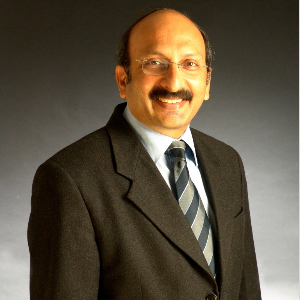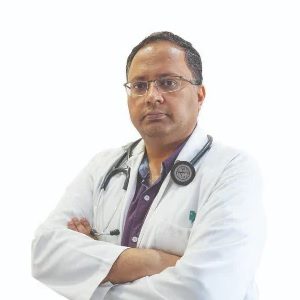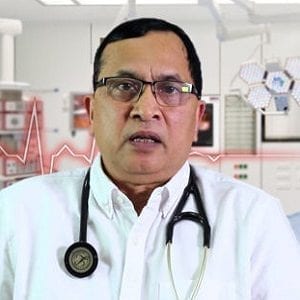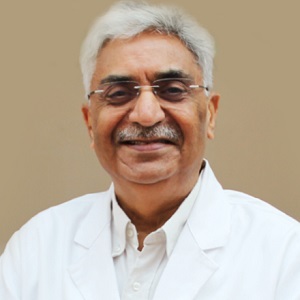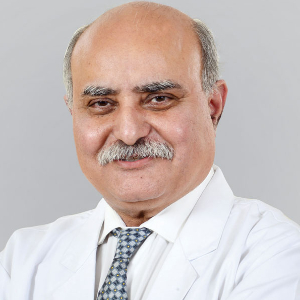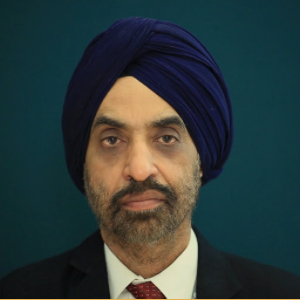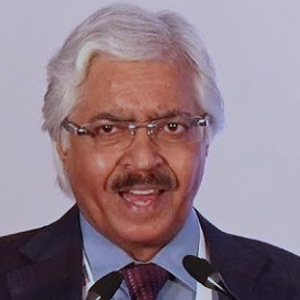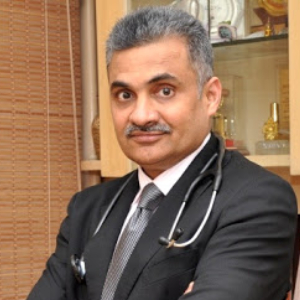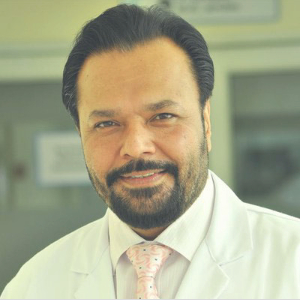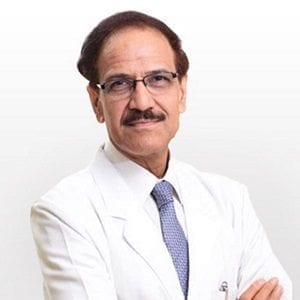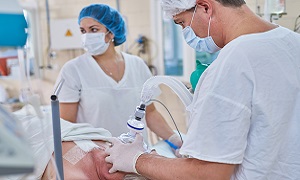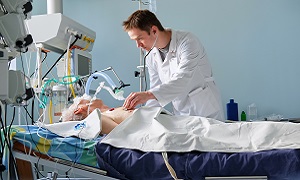Best Doctors in India for Aortic Valve Repair / Replacement
- Interventional Cardiologist, Gurugram, India
- Over 30 years’ experience
Profile Highlights:
- Dr. Praveen Chandra is one of the most well-known and respected Interventional Cardiologists in India and performs over 5000 percutaneous and diagnostic interventions every year.
- He specializes in devising techniques that help minimize open surgeries. Dr. Praveen Chandra performed the first Percutaneous Aortic Valve implantation without surgery in India.
- He also developed techniques to reduce the number of patients requiring bypass surgeries and has been trying to make angioplasty techniques more accurate to help with the treatment of multiple blocked arteries.
- Interventional Cardiologist, New Delhi, India
- Over 23 years experience
Profile Highlights:
- Dr. Amit Mittal is a cardiologist working at Indraprastha Apollo Hospital in New Delhi with experience of over 23 years in Interventional Cardiology.
- He is good to consult for Angiogram, Angioplasty, and Bypass Surgery. Dr. Mittal has performed over 15,000 cardiac procedures till now. He offers services like EPS and RFA procedures, pacemaker implantation, ECG, complex surgery of heart valve replacement, and angina treatment, to name a few.
- Apart from that, Dr. Mittal won a Gold medal in MBBS 1st y and for the highest marks in obstetrics and gynecology. He published many papers in national and international medical journals and chapters in textbooks.
- Cardio Thoracic & Vascular Surgeon, New Delhi, India
- Over 30 years’ experience
Profile Highlights:
- Dr. Bhaba Nanda Das is a well-known cardiovascular and cardiothoracic surgeon and has performed the first Coronary Artery Bypass Grafting (CABG) on a beating heart in India.
- He has performed over 20,000 cardiac surgeries and does more than 800 cardiac surgeries annually.
- With a keen interest in cardiovascular and thoracic procedures, Dr. Das is the first cardiac surgeon to use all arterial grafts for multiple coronary revascularizations. He was also the first to use coronary sinus in Fontan’s circulation.
- Vascular Surgeon and Interventional Cardiologist, Gurugram, India
- Over 30 years’ experience
Profile Highlights:
- Dr. T S Kler is undoubtedly one of the best vascular surgeons not only in India but also abroad. He has performed more than 25,000 Surgeries in his life which makes him stand where he is.
- He is a pioneer in electrophysiology & he established the first dedicated Electrophysiology department in India at Fortis Escorts Heart Institute.
- Dr. T S Kler initiated a radio Frequency Ablations programme at Escorts in 1993, one of the first of its kind in India. He was the first doctor in India to implant an ICD, CRT-P & CRT-D.
- Cardio Thoracic & Vascular Surgeon, New Delhi, India
- Over 30 years’ experience
Profile Highlights:
- Dr. Ajay Kaul is a leading name in the field of Cardiothoracic and Vascular Surgery in India with over 3 decades of experience.
- He specializes in Coronary Bypass surgery and is one of the best with the highest number of total arterial coronary bypass surgery (4000+) by using two internal mammary arteries from the chest and without any cuts on arms and legs.
- He is also an expert in minimally invasive cardiac surgeries (MICS) and has performed more than 4000 MICS which is the highest by any cardiac surgeon in India.
- Cardiologist, New Delhi, India
- Over 32 years’ experience
Profile Highlights:
- Dr. Balbir Singh is a reputed cardiologist with over 32 years of experience, considered a veteran in his field, both nationally and internationally.
- He has also pioneered several minimally invasive cardiology surgical techniques in India and has been honored with the prestigious Padma Shree Award for his exceptional performance.
- “LIMCA” Book of Records also highlighted Dr. Balbir Singh’s contribution to the medical field in the Indian Electrophysiology Journal.
- Interventional Cardiologist, New Delhi, India
- Over 30 years’ experience
Profile Highlights:
- Dr. Ashok Seth is one of the most well-known Interventional Cardiologists in India honored with both the Padma Shri and Padma Bhushan by the Government of India.
- He has more than 3 decades of experience in interventional cardiology and has performed over 20, 000 angioplasties and 50,000 angiograms till date.
- Dr. Seth holds a Fellowship of the Royal College of Physicians of Ireland, London, and Edinburgh along with several other degrees to his name.
- Interventional Cardiologist, New Delhi, India
- Over 20 years’ experience
Profile Highlights:
- Dr. Praveer Aggarwal is a nationally acclaimed and highly professional Interventional Cardiologist.
- His specialization lies in the treatment of blockages of the coronary and peripheral arteries and is an expert in Rotational and Directional atherectomy, intravascular ultrasound, pressure wire, and the use of Drug Eluting Stents.
- Along with his team at Fortis Escorts Heart Institute, Dr. Aggarwal performs close to 2000 angiographies and over 2000 coronary interventions including coronary angioplasties every year.
- Interventional Cardiologist, Gurugram, India
- Over 27 years’ experience
Profile Highlights:
- Dr. Manjinder Sandhu is a leading interventional cardiologist based in Gurugram who holds an extensive experience of over 27 years in the field.
- His primary interest lies in Complex Coronary Interventions, Trans-radial Interventions, and Balloon Valvuloplasty, and has performed a large number of such procedures in his career mainly while serving in the Army Medical Corps.
- Dr. Sandhu has been teaching and training postgraduate students in Cardiology and Medicine and has been a guide to several successful cardiologists in India.
- Interventional Cardiologist, New Delhi, India
- Over 20 years’ experience
Profile Highlights:
- Dr. Subhas Chandra is a leading Interventional Cardiologist who holds close to 20 years of experience and specializes in coronary interventions, endovascular interventions, device implantation, and structural heart diseases.
- He has performed more than 25,000 coronary interventions (complex angioplasty and rotablation), 4000+ for structural heart diseases, and has done more than 3000 permanent pacemaker implants.
Best Hospitals in India for Aortic Valve Repair and Replacement
Fortis Escorts Hospital, New Delhi
- City: New Delhi, India
Hospital Highlights:
- Over the last 33 years, the Fortis Escorts Heart Institute has set new standards in cardiac treatment with groundbreaking research. It is now known around the world as a centre of expertise for Cardiac Bypass Surgery, Interventional Cardiology, Non-invasive Cardiology, Paediatric Cardiology, and Paediatric Cardiac Surgery.
- The hospital has cutting-edge laboratories that perform a wide range of diagnostic tests in Nuclear Medicine, Radiology, Biochemistry, Haematology, Transfusion Medicine, and Microbiology.
- Fortis Escorts Heart Institute boasts a diverse group of bright and experienced doctors who are backed up by a team of highly qualified, experienced, and devoted support professionals as well as cutting-edge equipment such as the recently installed Dual CT Scan.
- Approximately 200 cardiac doctors and 1600 personnel currently collaborate to manage over 14,500 admissions and 7,200 emergency situations each year. The hospital now has a 310-bed infrastructure, as well as five cath labs and a slew of other world-class amenities.
Rela Hospital, Chennai
- City: Chennai, India
Hospital Highlights:
- RIMC is a multi-specialty hospital in a sprawling area of 36 acres located in Chromepet, Chennai, Tamil Nadu, India.
- The facility has 450 beds including 130 critical care beds, 9 operating rooms, modern reference laboratories and radiology services, and is conveniently located near road, rail and air transportation.
- RIMC is led and managed by world-renowned physicians committed to healthcare.
- RIMC offers the broadest range of clinical care, education, and research. The hospital offers state-of-the-art technology and modern treatment facilities designed to provide health care at an affordable cost.
- Rela Institute is driven by patient needs, comfort and confidence.
CARE Hospitals, Hyderabad
- City: Hyderabad, India
Hospital Highlights:
- CARE Hospitals were established in the year 2000, by CARE Group.
- The multispecialty hospital has 435 beds, including 120 critical care beds, with an annual inflow of 180000 outpatients and 16,000 in-patients.
- The hospital provides specialty medical services in Cardiology, Cardiothoracic Surgery, Pediatric Cardiology, Pediatric Cardiothoracic Surgery, Neurology, Neurosurgery, Nephrology, and Urology.
- The hospital has the first dual source, 128 slice CT scanner (for high precision cardiac imaging) – the first of its kind in south India.
- The hospital offers a wide range of accommodation facilities for the convenience of its varied patient base, ranging from general wards to super deluxe rooms.
Fortis Hiranandani Hospital, Mumbai
- City: Mumbai, India
Hospital Highlights:
- Fortis Hiranandani hospital was established in 2007.
- The hospital is an advanced tertiary care, multi-specialty hospital equipped with 149 beds.
- The hospital is equipped with a super ICU to provide emergency medical care to critically ill patients.
- The hospital is NABH accredited.
- The critical care facility in the hospital is augmented with the state-of-the-art facilities that facilitate speedier diagnosis and efficient monitoring.
- The hospital provides specialty medical services in cardiology, orthopedic science, pediatric science, neurology, diabetic care, urology, nephrology, ENT, obstetrics, gynecology, cosmetic surgery, bariatric surgery, neuro and spine care.
Fortis Hospital, Anandpur, Kolkata
- City: Kolkata, India
Hospital Highlights:
- Fortis Hospital, Anandapur, Kolkata is a world-class super-speciality equipped with the latest technologies in the medical world.
- The hospital is NABH accredited.
- This state-of-the-art facility specializes in cardiology and cardiac surgery, urology, nephrology, neurosciences, orthopaedics, digestive care, emergency care and critical care.
- The hospital, governed by integrated Building Management System (IBMS), has a pneumatic chute system, for quick vertical and horizontal transportation between floors, facilitating speedy transfer of patient specimens, documents, reports, and medicines to the concerned departments.
- The hospital also has a nephrology department with over 28 advanced dialysis units.
Fortis Hospital Banerghatta, Bengaluru
- City: Bengaluru, India
Hospital Highlights:
- Fortis Hospital Bannerghatta, Bengaluru was established in 2006.
- The hospital is a 276 bedded multi-specialty tertiary care facility.
- The hospital specializes in cutting-edge medical technology and dedicated patient care services.
- The hospital is equipped with state-of-the-art technologies like trans-radial angioplasty, trans-abdominal cardiac surgery, and computerized TKR navigation surgery.
- The hospital provides specialty medical services in cardiology, cardiac surgery, orthopedics, neurology, neuro-surgery, GI, and Minimal Access Surgery (MAS).
Fortis Hospital, Malar, Chennai
- City: Chennai, India
Hospital Highlights:
- Fortis Malar was established in 1992 and was formerly known as Malar Hospital.
- The hospital specializes in cutting-edge medical technology and dedicated patient care services.
- The hospital is multi-specialty, tertiary care facility with 180 beds.
- The hospital offers comprehensive medical care in specialties such as cardiology, cardio-thoracic surgery, neurology, neurosurgery, orthopedics, nephrology, gynecology, gastroenterology, urology, pediatrics, and diabetes.
Gleneagles Global Hospital, Parel, Mumbai
- City: Mumbai, India
Hospital Highlights:
- Gleneagles Global Hospital The 450-bed facility comprises of 17-stories, housing state-of-the-art infrastructure, and advanced medical care facilities.
- The hospital offers end-to-end clinical, surgical, and diagnostic services. It is equipped with a team of eminent medical professionals aided by qualified nurses and medical staff
- The Hospital offers advanced Endoscopic procedures, Hepatobiliary and Liver Surgeries, Surgical and Medical Gastroenterology, Bariatric Surgery, and Robotic surgery.
- The hospital is a center of excellence for Orthopedics, Joint Replacement, Knee Replacement, and Hip Replacement surgery.
Jaypee Hospital, Noida
- City: Noida, India
Hospital Highlights:
- Jaypee Hospital is the flagship hospital of the Jaypee Group.
- This hospital has commissioned 525 beds in the first phase and has been planned and designed as a 1200 bedded multi-specialty facility.
- It holds the accreditation of the NABH and NABL.
- The hospital has state-of-the-art infrastructure equipped with the latest technologies and modern equipment like 64 Slice PET CT, Dual Head 6 Slice SPECT CT, Gamma Camera, and Da Vinci Robotic Surgery for comprehensive robotic surgical solutions.
- It has special Centers dedicated to the major specialties to provide hassle-free and high-quality clinical care.
Manipal Hospital, Dwarka, Delhi
- City: New Delhi, India
Hospital Highlights:
- Manipal Hospitals, Dwarka, is a super-specialty hospital in Dwarka, New Delhi, which is a part of Manipal Hospitals Group.
- The hospital aims to provide the best treatment on par with international standards at a fraction of the cost.
- Equipped with 380 beds, the hospital is also one of the new age hospitals which are equipped fully with state-of-the-art infrastructure, cutting-edge technology as well as the latest and advanced clinical practices. The hospital also has 13 modular Operation theatres with 118 beds which are solely meant for critical care.
- The hospital comprises internationally acclaimed doctors and highly professional and experienced hospital and medical staff who are able to provide preventive, therapeutic, and diagnostic services all under one roof.
Aortic Valve Replacement
Purpose
There are several types of valve diseases for which aortic valve replacement might be considered. Some of them include:
Aortic valve regurgitation- This condition is known to occur when your blood flows backward through your aortic valve into the left ventricle each time the ventricle relaxes. Normally, blood is supposed to flow in one-way direction from the ventricle to the aorta. A dysfunctional or a leaky valve can lead to the backflow. This may be due to the valve deteriorating, an abnormal valve shape present at birth or due to an infection.
Aortic valve stenosis- The stenosis can lead an aortic valve to become narrowed or obstructed, which can make it even more difficult for the heart to pump blood into the aorta. This may be caused by multiple factors, such as congenital heart disease, thickening of the valve’s closure flaps or post-inflammatory changes, such as those which are associated with rheumatic heart disease.
Congenital heart disease- This can contribute to either aortic valve regurgitation or stenosis. It can also result in other problems that can prevent the proper functioning of the aortic valve. For example, a person might be born with an aortic valve not having enough tissue flaps or there may not be an opening in the valve to allow normal blood flow. The valve can also be of the wrong shape of size.
For some people who are having mild aortic valve disease without any symptoms, careful monitoring under an experienced doctor’s supervision might be all that is required.
However, in many cases aortic valve disease and dysfunction can worsen over time despite medical treatment. Most aortic valve conditions are mechanical problems that are not treatable with medications alone. Such conditions can eventually require surgery for reducing symptoms.
Your doctor and healthcare team will decide whether to go for repair or replacing the heart valve. It can depend on various factors, such as the severity of your aortic valve disease, your age and overall health or whether you require any heart surgery for any additional heart problem.
Preparation
Before you undergo the surgery for having your aortic valve repaired or replaced, your doctor and treatment team will be explaining what you can expect before, during and after your surgery as well as the potential risks the surgery may cause.
You need to discuss with your doctor and the treatment team any questions you might have about your procedure.
Before you are admitted to the hospital for your surgery, talk to your caregivers about your hospital stay and discuss any help you may require when you return home.
Also remember to talk to your doctor about when you can resume taking your medications regularly and whether you will be able to take them before your surgery. Also, ask whether you should stop eating or drinking the night before the surgery. You may also need to bring several items to the hospital including a list of your medications, eyeglasses, hearing aids, etc.
Procedure
For the aortic valve replacement procedure, you will be receiving anesthetics so that you will not be feeling any pain. You will be unconscious during the procedure.
You will be connected to a heart-lung bypass machine, which will keep your blood moving through your body during the procedure.
First, your doctor will be removing the aortic valve and replacing it with a mechanical valve or a valve made from a pig, cow or human heart tissue (valve).
Often biological tissue valves eventually need replacement as they degenerate over time. If you have a mechanical valve, you will require blood-thinning medications for the rest of your life for preventing blood clots. Doctors will be discussing with you the risks as well as the benefits of each type of valve and discuss which valve is appropriate for you.
The surgery can be performed through traditional open-heart surgery or minimally invasive methods. It involves smaller incisions than those used in open-heart surgery. There is another type of minimally invasive aortic valve replacement which is known as transcatheter aortic valve replacement.
However, minimally invasive aortic valve replacement is generally less common since not all situations are best addressed by this method of access to the damaged valve. Results similar to those with traditional open-heart surgery can be achieved if it is performed by experienced surgeons.
After the procedure
If you had open-heart surgery, you will generally require spending a day or more in the ICU. You will receive oxygen, fluids, medications as well as nutrition through the intensive care unit. Other tubes will be draining urine from your bladder, draining fluid and blood from your chest.
Later you’ll be moved to a regular hospital room where you will need to spend some days. The amount of time you will spend in the ICU and hospital may vary depending on your condition and procedure.
During your stay at the hospital, your treatment team will be watching for signs of infection in your incision sites. They will also be checking your blood pressure, breathing and heart rate periodically. If you experience pain after the surgery, they will be working with you in managing it.
Your doctor might also advise you to avoid driving a car or lifting anything more than 10 pounds for a few weeks.
Risks
There are certain risks associated with aortic valve replacement. The type of procedure and the expertise of your health care team also plays a role.
Although most people do well during this surgery, it might lead to a few problems, which include:
- Bleeding after surgery
- Infection
- Blood clots
- Heart rhythm getting thrown off for a while
- Kidney problems that can last for multiple days after surgery
- Stroke
- New valve not functioning or wearing out over time
Although rare death can also occur in a few cases. To minimize risk it is recommended that the surgery is performed by an experienced team of qualified doctors.
Aortic Valve Replacement & Aortic Valve Repair
Aortic valve repair and aortic valve replacement are procedures that treat diseases affecting the aortic valve. Types of Aortic Valve Surgery are:
- An annuloplasty is a procedure to tighten or reinforce the ring around a valve in the heart.
- A valvuloplasty, also known as balloon valvuloplasty or balloon valvotomy, is a procedure to repair a heart valve that has a narrowed opening.
Open Heart surgery versus Catheter method of Heart Replacement
Traditionally, all valve replacement procedures required a open-heart surgery. However, recent advances in catheter methods have resulted in the development of catheter- based (non-surgical) heart valve replacement procedures.
The Catheter based approach to Valve Repair is generally recommended in case of Valve Stenosis (condition in which the valve narrows down).The procedure is called Transaortic Valve Implantation/ Replacement (TAVI/TAVR) for Aortic Valve Repair. In case of Mitral Valve Repair, it is called Transaortic Mirtral Valve Implantation/ Replacement (TMVI/R).
TAVI / TMVI is the first line of treatment in cases of Valve narrowing /stenosis.
The advantage of TAVI/TMVR is that in this procedure, the valve is replaced with no scar (unlike surgery) and recovery time is minimal.
However, in cases of Valve Regurgiation (leakage), surgery is still required / recommended.

